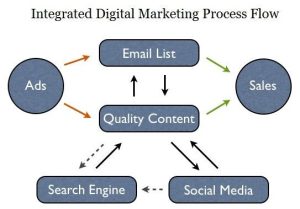If you want to succeed with your digital marketing efforts, it’s essential to study and understand all the channels and tactics available to you.
What is digital marketing?
Digital marketing includes all marketing efforts that use the internet and electronic devices, connecting audiences and customers wherever they may be online.
Professionals can gain expertise in digital marketing and improve their digital marketing efforts through courses and content.
A few of the critical parts of digital marketing are as follows.
- Search engine optimization (SEO). Channels that benefit from SEO include: websites, blogs, infographics
- Content marketing. Channels that benefit from content marketing include: blog posts, ebooks and whitepapers, infographics, online brochures
- Email marketing. Including emails that contain follow-up, customer welcome, promotions, tips for customer nurturing, blog subscription newsletters, etc.
- Social media marketing. Including marketing on Facebook, Twitter, LinkedIn, Instagram, Pinterest
- Pay-per-click (PPC). For example, paid ads on Facebook promoted Tweets, sponsored LinkedIn messages, etc.
- Affiliate marketing. For example, affiliate links on social media accounts and video ads on the YouTube Partner Program
- Native advertising such as Instagram advertising and Facebook advertising
- Marketing automation. For example, the automation of lead-nurturing workflows, email newsletters, contact list updating, social media post scheduling, campaign tracking, and reporting
- Online PR. Channels that benefit from PR efforts include: reporter outreach via social media, engagement through blogs or websites, and engagement through online reviews
- Inbound marketing. Includes a full-funnel approach to attract, engage, and delight customers using online content through any or all of the methods mentioned above.
How is digital marketing successful?

Providing a great user experience on your website is a major key to success in digital marketing. Your website is the brand online and should not only provide information but offer easy tools to sell products or drive customers to buy your product.
Which type is best in digital marketing?
To help you determine which digital marketing strategies may work best for your business, here are six of the most effective types of digital marketing:
- Content Marketing. …
- Search Engine Optimization. …
- Search Engine Marketing/Pay-per-Click. …
- Social Media Marketing. …
- Affiliate and Influencer Marketing. …
- Email Marketing.
Why do businesses adopt digital marketing?
Digital marketing benefits the marketer and the customer in several ways. However, businesses adopt digital marketing strategies and tactics mostly because it’s quantifiable, results-driven, adaptable, and faster than any other form of marketing available to any company no matter its size.
Recent trends in digital marketing
As marketers discover greater ways to connect with their audiences and as consumers want better ways to interact with brands, marketing trends are continuously changing.
10 Ways businesses can achieve success in their digital marketing efforts.
Businesses can succeed in their marketing in the following ways by integrating the above-mentioned channels and strategies, keeping in mind current trends and technology that make it simpler to connect, and doing so at the same time.
1. Be flexible and open to change.
For businesses to prosper and thrive in today’s environment, they must embrace the quick changes taking place in the field of marketing and adjust their new tools, plans, and techniques as necessary.
2. Set SMART objectives.
It is crucial to set SMART (Specific, Measurable, Attainable, Relevant, and Time-bound) goals that are aligned with your digital marketing strategy. As an illustration, a conversion goal would be to raise the average order value in online sales from $30 to $40.
3. Execute flawlessly.
You must carry out your aim plan for accomplishing your SMART objectives promptly after creating it. Perfect execution will enable you to gather information and adapt your plan in response to customer feedback. Additionally, these adjustments must be made rapidly.
4. Exercise creativity throughout the process.
Be original and creative from the planning stage when using the content and many integrated channels (omnichannel marketing) to reach your audience and potential clients.
Content may take the form of pictures, infographics, movies, contemporary websites, tasteful designs, etc. Mobile, social, web, phone, and brick-and-mortar retail can all be considered integrated channels.
5. Target audience with market segmentation.
Marketing success depends on knowing your target demographic and connecting with them wherever they are. By examining audience behavior and characteristics and grouping like attributes, marketing segmentation is helpful in assisting marketers in accomplishing this so that audience demands can be prioritized appropriately. Marketers may effectively attain even higher levels of granularity and accuracy by utilizing AI and automation.
6. Diversify your channels, tactics, and strategies.
You become more receptive to the idea that experimenting with various channels, tactics, and strategies is an essential component of success by realizing that no single marketing plan is ideal.
This mindset has the advantage of introducing you to audiences and clients you were unaware existed. You can discover new cash sources with the aid of these new audiences and clients.
7. Integrate your sales and marketing.

Because these teams will be cooperating rather than competing, integrating sales and marketing enables firms to utilize every facet of digital marketing (knowingly or unknowingly).
The usage of data, tools, seamless customer handoff to other teams, etc. are all areas that can be optimized.
8. Collect, measure, track, and analyze data.
In order to give your consumers the kind of service they expect today and to stay competitive, data is essential. As a result, organizations must collect, measure, track, and analyze data in real-time to gain insights if they want to be successful with their digital marketing campaigns.
9. Always stay connected to your audience.
Today’s consumers desire constant access to their chosen vendors’ information and communication. Therefore, businesses must foster a constantly linked atmosphere to satisfy this desire by making tools available in addition to current material.
10. Collect feedback and respond to it accordingly.
Use comment pages, polls, and surveys to get audience and customer feedback. Use one of our practical, cost-free feedback email templates.
Conclusion
There are benefits to using marketing in business, and it’s up to you whether you want to try them out or just disregard what digital marketing can do to benefit your company. Marketing is boosting your business worldwide. If you learn digital marketing in Surat then Simba Institute has the best digital marketing course that change your life.
